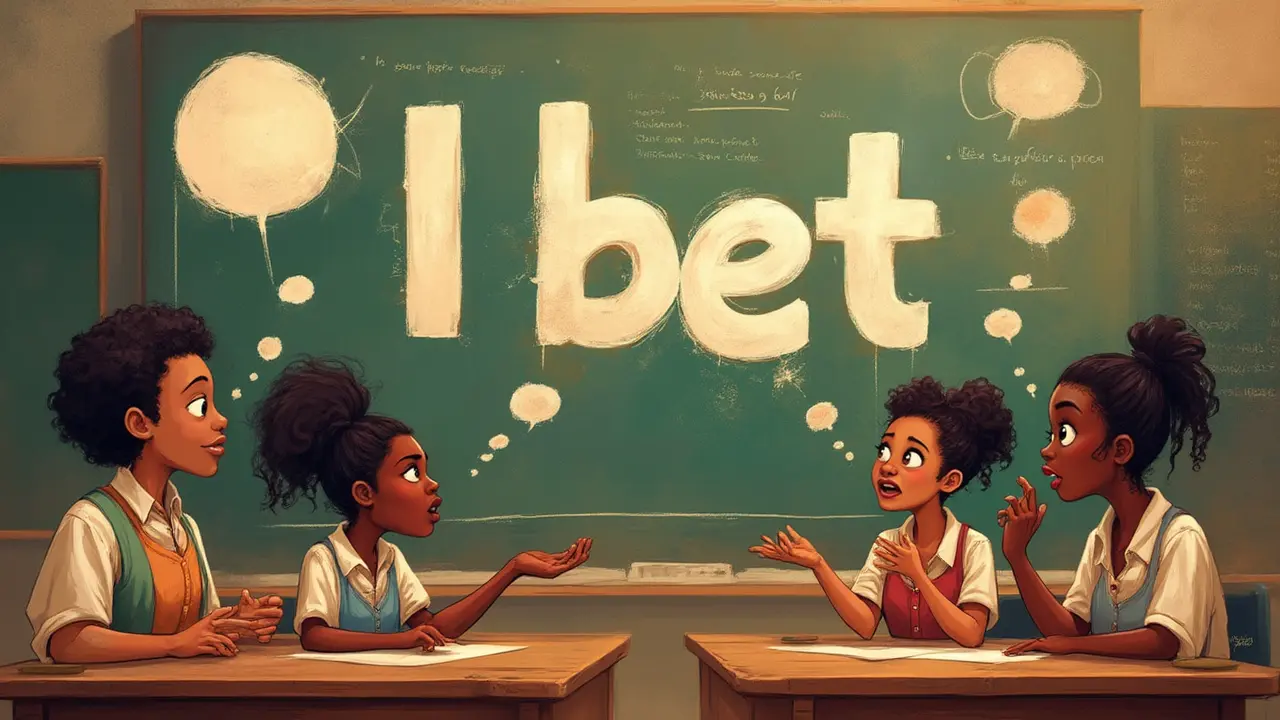
Ever catch yourself—or someone else—throwing out an “I bet” during a chat and wonder why it’s become such a go-to phrase? Think about it. You’re squeezing through traffic, venting about work, or talking about some wild weekend plans, and someone answers with a simple, “I bet.” Not much fanfare, but somehow it fits perfectly. Its bluntness, the slightly raised eyebrow, the instant sense of rapport, or maybe the playful way it can dismiss or hype up a story—there’s something about “I bet” that just clicks with people. It’s gone from a gambler’s taunt to the ultimate conversational Swiss Army knife.
The Real Roots: How "I Bet" Entered Our Vocabulary
Betting has been around pretty much as long as there have been people willing to take a risk. The phrase “I bet” started out where you’d expect—in the world of gambling and wagers. But how did it leap from smoke-filled gambling halls into texts, tweets, and TikTok comments? Linguists trace “I bet” back to 16th-century England, where betting wasn’t just a pastime, but a central part of social life. The original use was literal: someone would actually be risking money or reputation. By the mid-1800s, American newspapers were already jotting down phrases like, “I bet you five dollars,” showing the phrase picking up steam across the Atlantic.
This shift didn’t take long. As early as the 1860s, people started tossing around “I bet” in a looser way, just to stress how sure they were about something. Kind of like how today we say “literally” way too much, back then “I bet” became a staple to drive any point home. Fast forward to the late 20th century, and it’s become a slangy way to respond—sometimes sarcastically, sometimes with real agreement. Now, it’s stamped all over messages and memes. Urban Dictionary, that weird crossroads of culture and creativity, dates the sarcastic version to the early 2000s. TikTok and Twitter just made it blow up, transforming it from a gamble to shorthand for “Sure, whatever you say.”
The evolution tells you a lot about humans: we love certainty, but we also love to hedge our bets, pun intended. When you say “I bet,” you’re staking your reputation on what you believe, but these days, it rarely means any money’s on the table. Just a quick way to say, “I’m fairly sure” or, sometimes, “Yeah, right.” If you look closely, you’ll never find two people using it exactly the same. That’s what makes it fascinating.
The Modern Meanings: What You’re Really Saying With "I Bet"
Now, let’s break down what you’re actually saying when “I bet” pops out of your mouth. The phrase packs a punch, but the punch changes depending on how you throw it. Mainly, you’ll find it lands in three big buckets: expressing certainty, showing empathy, or dropping some classic sarcasm. Here’s how each flavor has evolved:
- Certainty: In its most basic form, you’re just saying you’re really sure. "I bet it’ll rain tomorrow." Simple as that. People use this to emphasize their confidence or to show they’ve been around the block and know how things go. It’s why poker players are so good at deadpan delivery.
- Empathy: Someone just told you they’ve had the worst week at work? “I bet.” It’s a way to say, “I feel you” without getting too mushy. This usage boomed after a 2018 BuzzFeed piece ranked popular empathy phrases, noting that “I bet” gave just the right note of distance plus understanding. Sometimes, fewer words say more.
- Sarcasm or Dismissal: Here’s where it gets juicy. You’re at a party and someone starts bragging, “I could totally eat a whole pizza,” and you reply “I bet.” Are you agreeing? Not really. It’s a sly way to say, “Sure, buddy.” This is where the phrase gets its sting, especially online. Social media loves this flavor, making “I bet” shorthand for not believing a word someone just said.
It all depends on tone, timing, and context. Just check out this snack of a quote from linguist Deborah Tannen in The New York Times:
“Phrases like ‘I bet’ serve as a sort of social glue. They're adaptable, partly serious, partly playful—partly true, partly bluff.”
Interestingly, this phrase never seems to stop shapeshifting. Young people drop it as a snappy reply, older folks use it to agree, coworkers might use it to keep a meeting flowing without wading into boring details. The wildest part? It never loses its punch, even if the dollars and cents of betting never actually materialize.

Pop Culture and How "I Bet" Went Viral
If you think “I bet” is just a verbal tic, take a stroll through pop culture. The phrase is everywhere, from films to sports banter, and especially in the wild world of memes. Hollywood loves a gamble, so no shock that “I bet” makes regular cameos in movies, TV, and music lyrics. Remember the 2007 hit song “I Bet You Look Good on the Dancefloor” by Arctic Monkeys? Even if not, pop culture has always borrowed from betting lingo for drama and punch.
Here’s something you probably haven’t seen: a quick look at how often "I bet" appears in social platforms compared to other betting phrases. Check out this data table based on a recent 2025 Statista report on common internet slang:
| Phrase | Usage Frequency Per Million Posts (2025) |
|---|---|
| I bet | 4750 |
| No cap | 4220 |
| Deadass | 2850 |
| For real | 2310 |
| No shot | 1190 |
This table tells a simple truth: “I bet” is up there with the internet’s favorite quick replies. TikTok videos and viral tweets have given it wings. In 2023, when NBA star Ja Morant tweeted “I bet” in response to another player’s smack talk, fans turned it into a running gag for weeks. That's how memes are born: simple, sharp language that fills a gap we didn’t know was there.
There’s also a rebellious side to it. When strict parents or teachers hear “I bet” from a kid, they know there’s attitude in there. Brands are no strangers to its pull: Taco Bell’s 2024 “I Bet You Can’t Eat Just One” campaign saw TikTok challenges spike, pulling in 2.9 million new mentions in just one week. So, if you’re a marketer or content creator, don’t underestimate the phrase. It hooks audiences because it’s fast, flexible, and tells a story in two words.
How To Use "I Bet": Tips You Won’t Find in Grammar Books
So, how do you drop a perfectly-timed “I bet” and not sound awkward? First, pay attention to the vibe—body language, facial expressions, and the speed of the conversation. If you want to use it to show skepticism, lean on a flat tone or raised eyebrow to get your point across. People catch on fast to these micro-signals, even online. Emojis help too—a smirking face works wonders. Want to be supportive? Pair it with a nod, or write it with extra context: “I bet… that sucks.” Easy, right?
You can also take cues from pop culture. Use it to punch up a punchline, break tension, or end a long story with a single, loaded phrase. Sports fans, especially, love it during heated debates: “He’s gonna break the record this season.” “I bet.” It signals experience and a dash of friendly skepticism, but doesn’t kill the fun. If you’re learning English, it’s a small but mighty phrase that fits into a ton of situations, from friendly chats to business meetings, as long as you nail the delivery.
Want to try it for yourself? Here are a few ways to slip “I bet” smoothly into your next conversation:
- When you agree: “My train was late again.” / “I bet.”
- When you’re playfully doubting a claim: “I can bench press 400 pounds.” / “I bet.”
- Showing you care, but want to keep it light: “This project kept me up all night.” / “I bet it did.”
- Cutting off a long story without being rude: “And then, after all that…” / “I bet. Ready for lunch?”
The best advice? Don’t force it. You don’t have to swap out every “Yeah, right” or “I know” for “I bet.” Let it show up naturally when the situation feels right. Just remember, delivery is king, context is queen, and tone rules the rest. Used cleverly, it can make you sound witty, informed, and maybe just a little bit mysterious. That’s not a bad bet to take, is it?
Write a comment
RECENT POSTS
- Signing Bonus Payouts: When And How You Actually Get Paid
- Player Support Channels: How Responsive is YesPlay's Customer Service?
- How to Verify Bank Account on YesPlay: Simple Steps That Work
- Where is YesPlay Located? Find Out Everything You Need to Know
- Maximizing Your Play: Exploring YesPlay's Promotions and Bonus Offerings
Written by Alistair Penrose
View all posts by: Alistair Penrose